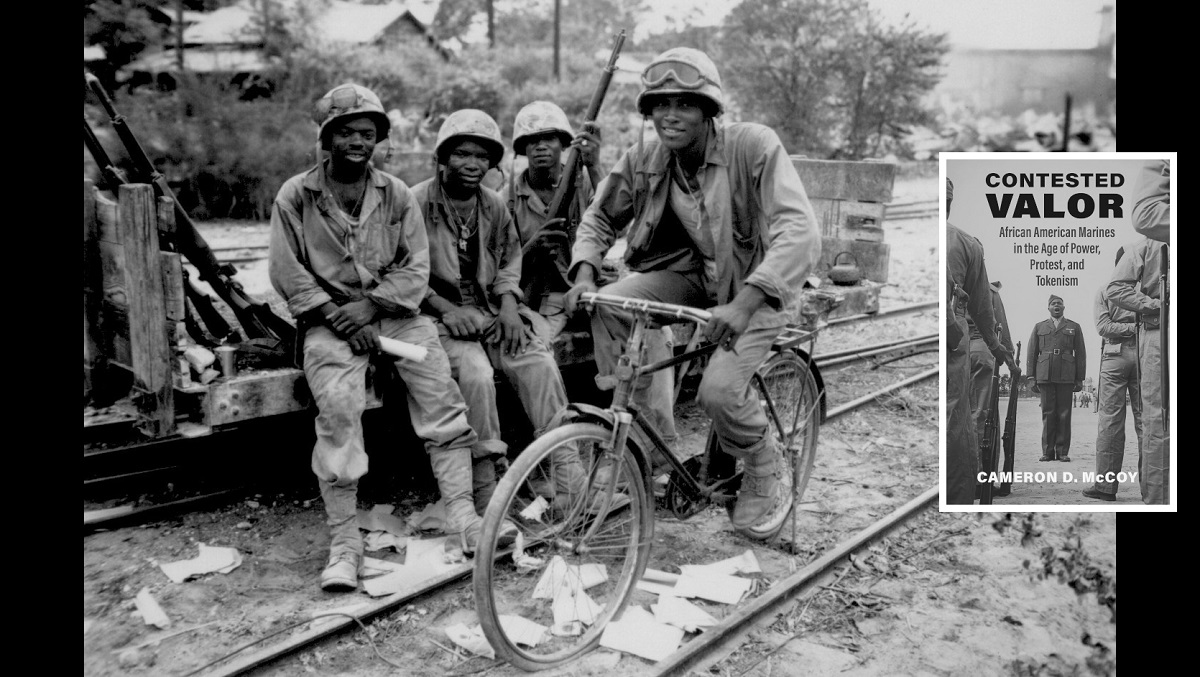
A new academic year brings a new lineup of speakers to the U.S. Army War College’s Civil-Military Relations Center. Host Carrie Lee welcomes Cameron McCoy to kick off the season with a dynamic discussion of McCoy’s new book, Contested Valor: African American Marines in the Age of Power, Protest, and Tokenism. They delve into the experiences of the legendary black Marines of Montford Point and explore the broader context of race relations in the U.S. military. This compelling conversation sheds light on the nation’s historical shortcomings regarding racism while acknowledging the progress made and emphasizing the ongoing need for change.
They were just falling in line with what they believe were the rites and passages of a social society that had a foundation that rested upon dividing one ethnic group from another.
Podcast: Download
Subscribe: Apple Podcasts | Spotify | Amazon Music | Android | Pandora | iHeartRadio | Blubrry | Podchaser | Podcast Index | TuneIn | Deezer | Youtube Music | RSS | Subscribe to A Better Peace: The War Room Podcast
Cameron McCoy, PhD, is a native of Washington, D.C., and has taught courses in 20th- and 21st-century U.S. history at the United States Military Academy at West Point, Brigham Young University, and the United States Air Force Academy. He earned his doctorate in U.S. history at the University of Texas at Austin after receiving a master’s in military history at Texas A&M University and his bachelor’s in International & Area Studies at BYU. He is the author of Contested Valor: African American Marines in the Age of Power, Protest, and Tokenism, published by the University Press of Kansas, released in October 2023. In addition to being an assistant professor and teaching courses on U.S. race relations, the Great Wars, modern warfare studies, and foreign policy, McCoy also serves in the Marine Corps Reserves as an infantry officer.
Carrie A. Lee is an associate professor at the U.S. Army War College, where she serves as the chair of the Department of National Security and Strategy and director of the USAWC Center on Civil-Military Relations. She received her Ph.D. in political science from Stanford University and a B.S. from MIT.
The views expressed in this presentation are those of the speakers and do not necessarily reflect those of the U.S. Army War College, U.S. Army, U.S. Marine Corps or Department of Defense.
Photo Description: Black Marines, attached to the 3rd Ammunition Company, take time out from supplying ammunition to the front line on Saipan. Riding a captured bicycle is Pfc. Horace Boykin while (left to right) Cpl. Willis T. Anthony, Pfc. Emmitt Shackelford and Pfc. Eugene Purdy watch, June 1944.
Photo Credit: Lance Cpl. Kris Daberkoe





Beginning at about the 40:00 point in this podcast, LTC McCoy speaking: ” … This is about power-sharing and it just happens to fall along racial lines.” As to that such “power-sharing” (or, indeed, “power-threatening?”) thought, consider the following observations:
1. Early post-the Old Cold War, the U.S./the West came to see such things as national security more in “economic competition” terms. (At this such early time, there was general agreement between many governments, militaries, their societies, etc., as to [a] this such “economic competition” paradigm and [b] what would need to be done to prevail within same?)
2. The U.S./the West then determined that — in order to remain “economically competitive” in the 21st Century — this would require that our businesses, militaries, etc., must embrace/must more enthusiastically embrace such things as “diversity, equity and inclusion.” (By embracing/better embracing such things as DEI, our business, military, etc., personnel — as they operated both here at home and there overseas — would gain better access to “the best and the brightest” and, likewise, would come look more like — and thus come to be more trusted by — the people that we were going to be selling our ideas and products to?)
3. The problem with this such effort, however, was that it tended to undermine the status quo degree of power, influence, control, status, prestige, privilege, safety, security, etc., that the various more-conservative/more traditional/more-exclusive/more-ensconced members of our and other societies — at that time — enjoyed. (ALL OF WHICH would now need to be sacrificed/would now need to be overcome; this, in the name of such things as economic competition and national security?)
4. The more conservative/the more traditional elements of the states and societies of the world — thus realizing that their degree of power, influence, control, etc., was being existentially threatened/would now need to be “shared” — came to realize that the only way that they might overcome/might deal with this such (power-sharing/power-undermining?) problem, this was by revolting and, thus, by becoming a national security threat/a national security problem themselves — one of at least equal to (or indeed greater) concern than the so-called “economic competition” problem. (In this such effort, these such conservative elements — and the states and societies that would seek to gain power, influence and control by supporting same [exs: China and Russia?] — have CLEARLY shown that they understand Clausewitz’s statement, that states/state leaders will pursue their political objectives until a point is reached where the costs exceed the benefit or the war aims? And that, accordingly, one’s opponents will do everything in their power to increase such costs?)
Another way of looking at these — and other — civil-elite, civil-government, civil-military, etc., matters:
During the Old Cold War, the gravest threat to the status quo (or the status quo ante; this, if too much unwanted change was thought to have already taken place), this was often considered to be the threat posed to same by the political, economic, social and value changes demanded by the communists and communism. (Such things as good civil-elite, good civil-government, good civil-military relations, etc. — during this time of the Old Cold War — thus often being derived from these entities’ [elites, governments, militaries] efforts to PREVENT, and/or to REVERSE, these such unwanted political, economic, social and/or value changes?)
Post-the Old Cold War, however, the gravest threat to the status quo (or the status quo ante; this, if too much unwanted change is thought to have already taken place), this is often considered to be the threat posed to same by the political, economic, social and value changes (ex: “power-sharing?”) demanded by the capitalists and capitalism. (Such things as bad/worsening civil-elite, bad/worsening civil-government, bad/worsening civil-military relations, etc. — thus today — often being derived from these entities’ [elites, governments, militaries]) efforts to PROMOTE, and/or to ACHIEVE, such unwanted political, economic, social and/or value changes?)
In circumstances such as these, does it not defy logic — and indeed common sense — to think that:
a. When U.S./Western governments, post-the Old Cold War, took the place of the communists governments; this, in working to achieve unwanted and threatening (“power-sharing”), etc., change that
b. Civil-elite, civil-government and civil-military relations — developed in the PREVENT CHANGE/REVERSE CHANGE era of the Old Cold War — these would not, also and accordingly, (negatively) change?
At approximately the 43:00 point in this podcast. Again, LTC McCoy speaking here:
” … When you are the dominant power, you are not going to give up power easily — nor do you want to share that power.”
From that such perspective, if the U.S./the West is the dominant power, and does not want to give up power — nor do we want to share power (for example, with China, Russia, etc., as they have been asking and maneuvering for us to do) — then should that decision, not to share power, be considered a bad thing — and/or something that should be considered as improper, immoral, irrational, etc.?
Herein, in all “power-sharing”/”power-changing” scenarios that we might consider, the (very understandable and rational?) concern generally is that — by sharing power — one’s current degree of (often very hard fought for and with great difficulty and great sacrifice won and preserved) power, influence, control, status, privilege, prestige, safety, security, etc. — these must be given up to some degree. (Yes. A cost/benefit analysis is going on here.)
The question asked, therefore, in “power-sharing” scenarios such as these, is:
By power-sharing, what (amazingly) greater good (SPECIFY!!!) am I going to gain; this, by putting myself in a position of graver danger and vulnerability — this, so as to avoid the problems (exs: bickering, revolts, etc.?) of those wishing for — and indeed striving significantly to achieve — greater power, influence, control, status, prestige, privilege, safety, security, etc.?